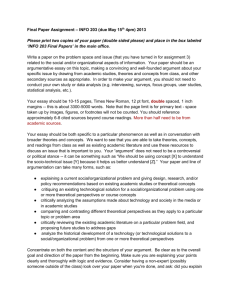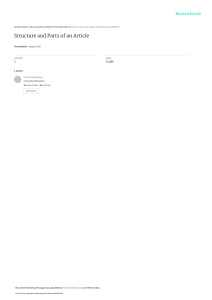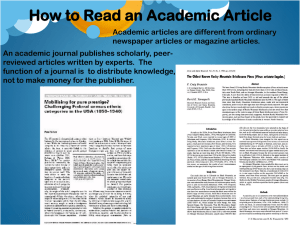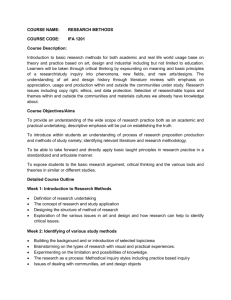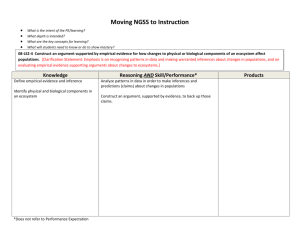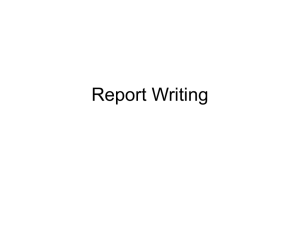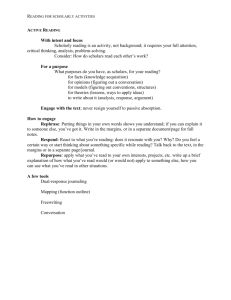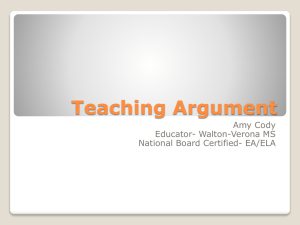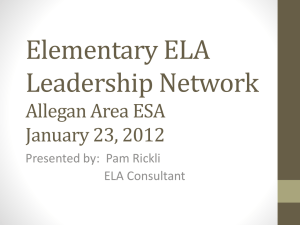Writing Literature Review
advertisement
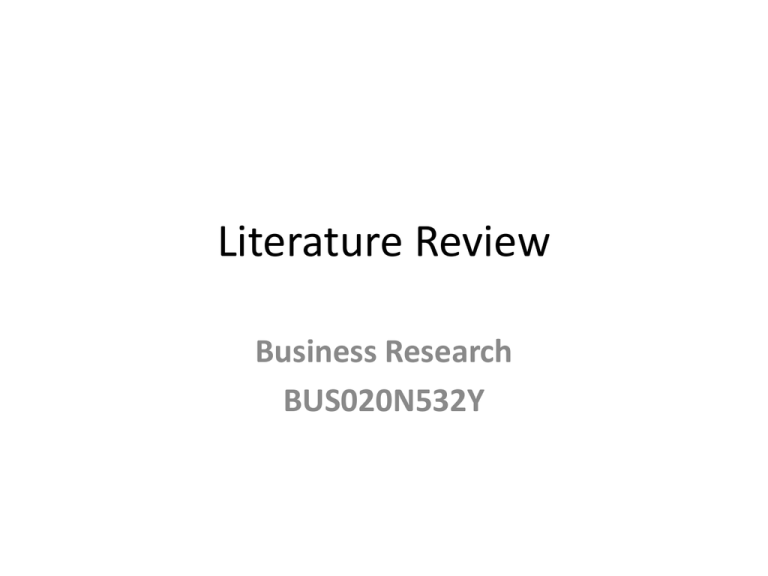
Literature Review Business Research BUS020N532Y Literature Review • How to search • How to read • How to write Goals of a literature review • To generate and refine your research ideas • To demonstrate familiarity with a body of knowledge • To show the development of previous research and how the current project is linked to it—‘positioning’ your research • To integrate and summarise what is known in a given area - areas of agreement/disagreement - key questions Types of Literature Popular literature • addressed to a general audience • almost always secondary source of information • e.g. Financial Times, Guardian, Wall Street Journal, Economist Scholarly Literature • addressed to a specialized audience (experts in the field) • usually primary source of information • e.g. American Economic Review, Journal of Economic Literature, Journal of Econometrics, Journal of Labor Economics, etc. How to search: effective search strategy How to search scholarly literature • Browsing Journal of Economic Perspectives Journal of Economic Literature • Keyword searching Online databases: Academic Search Premier, Business Source Premier, Emerald, JSTOR, ScienceDirect. Use Boolean operators and wildcard character: AND is used to narrow a search; OR is used to widen a search; NOT means exclude; wildcard character (*) A Basic Search Strategy 1. 2. 3. 4. 5. Begin by stating your research topic or question; Identify important concepts relevant to your topic; Brainstorm to create a list of keywords that describe these concepts; Determine any synonyms to these keywords; Choose a subject approach; that is, determine which discipline or disciplines are likely to have literature on your topic; 6. Determine which search features may apply (e.g. Boolean operators, wildcards); 7. Choose an appropriate database to search the given subject; for example, JSTOR; 8. Read the search instructions for the database; 9. Create a search expression using the appropriate syntax; 10. View the results; 11. Modify the search if necessary (return to Step 2); 12. Try the same search with another database (return to Step 6) How to Read Critically • Scholarly work should be read differently • You need to have a conversation with the paper – What arguments is the paper making? Why are they important? Do you agree? Why or why not? • Critical Distinctions – – – – – Who is speaking vs. the idea they address Matters of taste vs. matters of judgment Fact vs. Interpretation Literal statements vs. ironic statements The validity of an idea vs. the expression of that idea. Getting through a Journal Article • It is very easy to get discouraged by the technical jargon, mathematics, and/or econometrics in an academic paper • Don’t! You can usually understand the key points of a paper even without any background. • Helpful tips: – Write down unfamiliar terminology and look it up (www.econterms.com) – Read the introduction and conclusion first – Only highlight/take notes until you have completed reading a section. – Trust in the peer-review process: the math is usually right. – Keep reading, eventually the author will explain the key points in nice plain language. – Write an abstract of the paper in your own words. Identifying an Author’s Argument The following are questions you should ask yourself whilst reading a journal article: 1. 2. 3. 4. 5. 6. 7. What question is the author asking? What answer does the author propose? In what ways does the study improve upon previous research? How does the proposed answer compare with that provided by previous research? What are the major logical or theoretical reasons for the author’s argument? What empirical evidence does the author provide? What assumptions is the author making in his or her reasoning? Evaluating the Author’s Argument Asking the following questions help you to guide critical reading: 1. Does the theoretical analysis make sense? 2. Are the data used adequate to the task? 3. Does the empirical methodology adequately test the hypothesis? 4. Are the assumptions reasonable? 5. Is the analysis (theoretical and empirical) clearly explained? 6. Do the conclusions follow from the evidence presented? 7. On balance, is the author’s argument convincing to you? How to write a literature review Remember that literature reviews are organised around ideas, and not the sources. To help you with this: • Identify shared themes, ideas, or issues that the literature sources? • Is there an idea that seems to be missing? • Do you like the theoretical approach in the literature? • What are the trends in the literature or current debates or developments? Develop an overall thesis statement that includes your perspective on the material you have reviewed How to write a literature review Literature reviews contain • Introduction: This should present the core idea – the thesis statement around which the argument will develop. This suggests the organisational pattern. • Body: This presents your summarisation, synthesis and argument with the existing literature. • Conclusion: This concludes your argument that you have developed from the literature, and identifies the implications for your own study. Reading • Greenlaw S. (2006) Doing Economics: a guide to understanding and carrying out economic research. Houghton Mifflin Company. Ch. 3, 6, and 12. • Saunders, M, Lewis, P. and Thornhill, A. (2009) Research Methods for Business Students, 5th edition, Harlow: Financial Times Prentice Hall. Ch. 3
